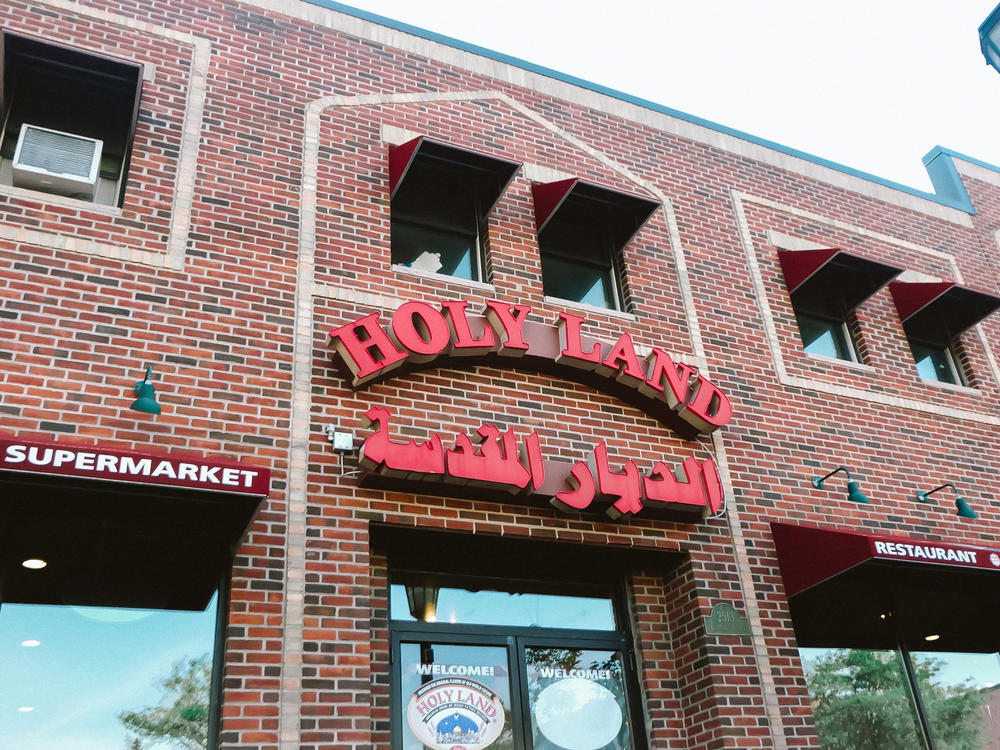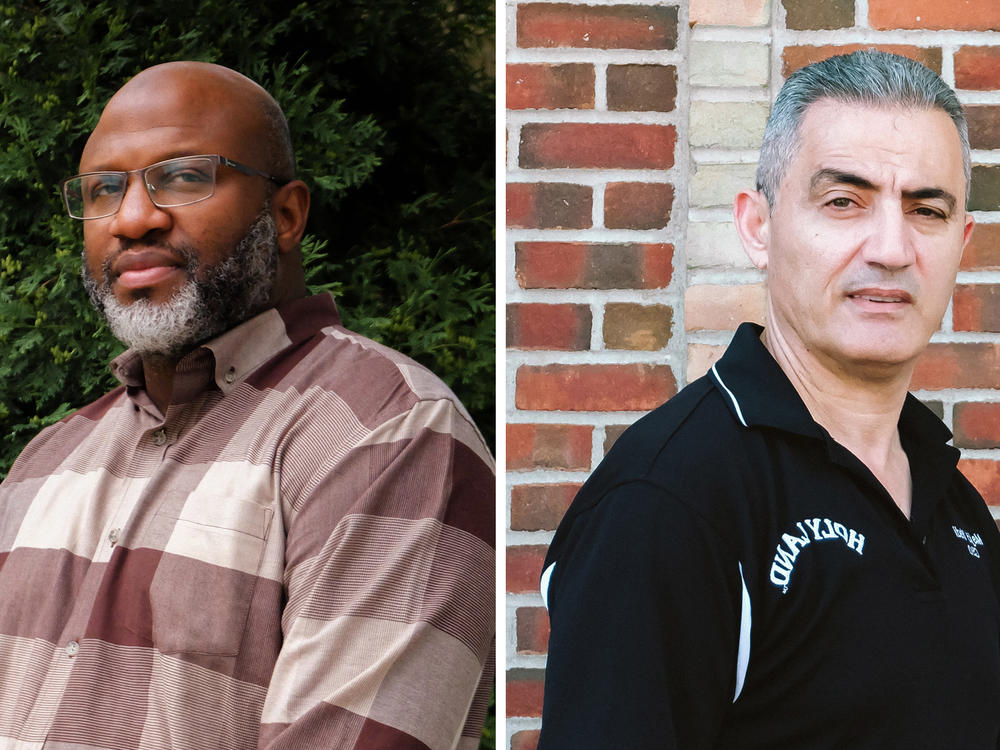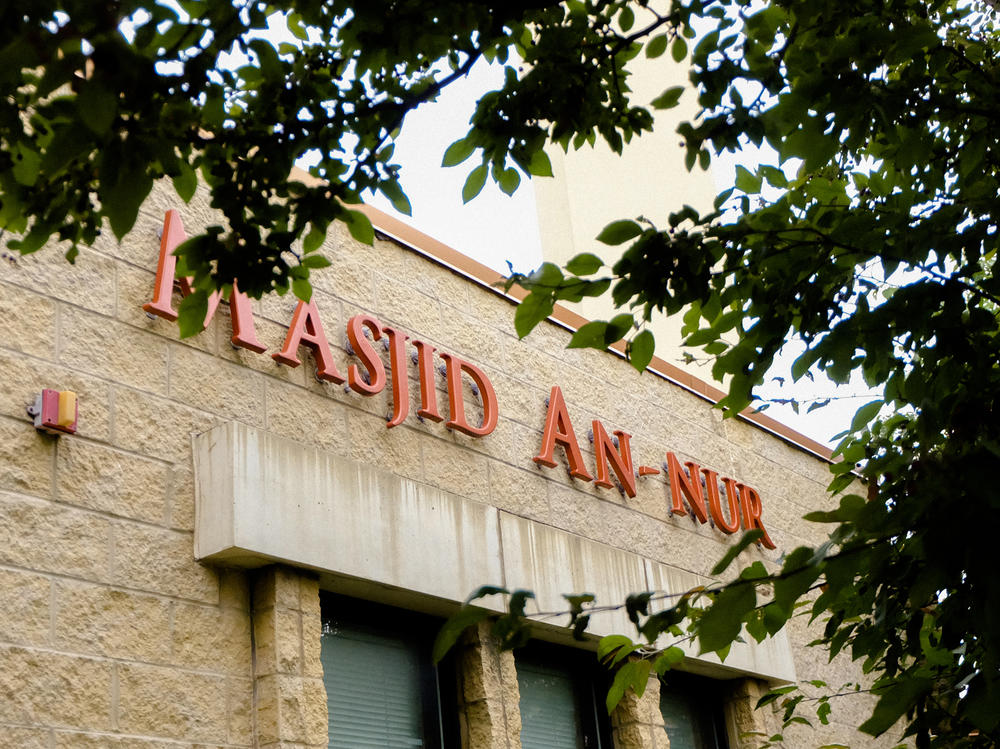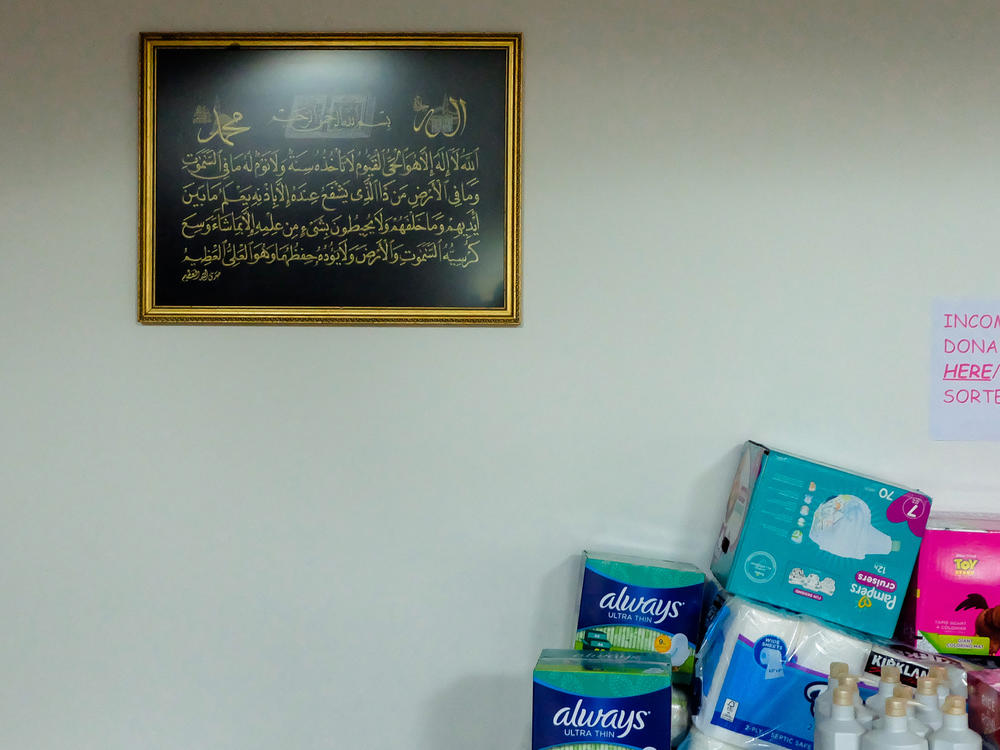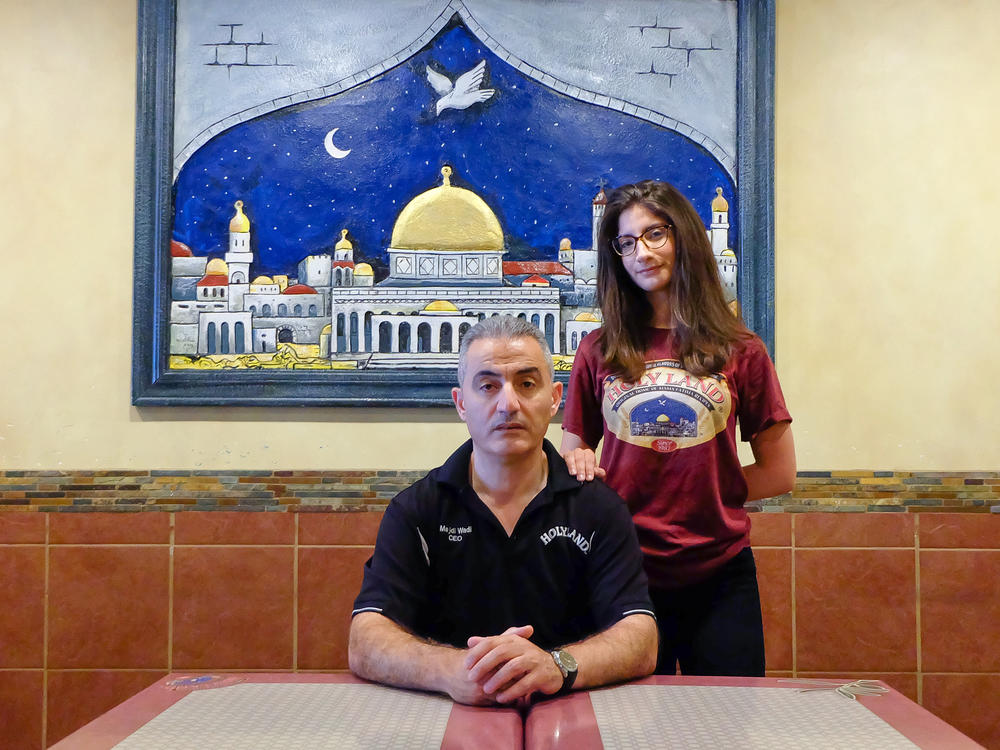Section Branding
Header Content
After Being Called Out For Racism, What Comes Next?
Primary Content
In Minneapolis, Majdi Wadi was a celebrated businessman. Three generations of his Palestinian American family run the Holy Land brand, a multi-million-dollar enterprise with restaurants, a grocery store, a bakery and a hummus factory. It's become well known locally and nationally after the Wadi family was featured on local television programs and on the Food Channel's Diners, Drive-ins and Dives for bringing a "little piece of the Middle East to the Midwest."
But the business Wadi and his family built in Northeast Minneapolis is in jeopardy now. Three days after George Floyd was killed by police, a series of anti-Black, anti-Semitic and anti-LGBTQ social media posts from Wadi's daughter, Lianne Wadi, dating back to 2012 and 2016, came to light. Wadi fired his daughter as director of catering within hours of the posts resurfacing, saying the behavior wouldn't be tolerated at the business.
But in the midst of mass protests against police brutality and systemic anti-Black racism, the reaction from the public was swift. Holy Land was evicted from one location over the posts, where it had a butcher store and deli. It has lost millions of dollars in contracts for its renowned hummus, closed its factory and two other Holy Land locations and laid off at least 46 people, mostly immigrants and people of color, in the face of a boycott campaign.
The incident also opened deep wounds in Minneapolis' ethnically and racially diverse Muslim communities about anti-Blackness. This, in addition to the call to police that led to George Floyd's death coming from a Palestinian Muslim-owned corner store, has become emblematic of the way systemic racism goes beyond the halls of power and seeps into businesses owned by non-Black people of color.
Now, Majdi Wadi is trying to save the business and his family's reputation. He says he's also determined to make amends for his daughter's posts and learn to be an ally fighting anti-Blackness going forward.
To figure out how to do that, Wadi called on the most prominent African American Muslim leader in Minneapolis: Imam Makram El-Amin.
"I said, 'I know you're busy. I need to see you. There is a situation here and I need your help, not help to bail me [out]," he recalls telling El-Amin.
On June 5, Wadi went to El-Amin's house for the first time in their years-long relationship, sat in his backyard and asked, "Brother Makram, I'm here to learn. Tell me what to do?"
El-Amin listened and asked for some time to think: "It's bigger than me now," he said.
That first conversation led to weeks of ongoing talks on what a path to redemption might look like after an act of racism. It's also raised difficult questions: Is there a path forward for Wadi's business once this kind of damage has been done? And if so, is it the job of a Black man to guide Wadi down that path?
El-Amin remembers the first time he saw Lianne Wadi's posts. There was the repeated use of the N-word, a reference to the elimination of "Jews, blacks and fats," and an anti-Black and homophobic tweet with the tag #s**tpeopleinmyfamilysay. He was stunned and hurt, he told me.
For her part, Lianne Wadi has apologized in the local press and on her Instagram, saying she's a different person now than she was when she wrote those posts."I was so shocked that I even posted something so offensive," she wrote. "I recognize the gravity of my words and how hurtful they can be and how hurtful they were. I wasn't thinking. I was a teenager at the time (although my youth is not an excuse) and wasn't educated on how the words I chose would affect and offend others, including myself." (Lianne Wadi chose not to speak to me for this story.)
Majdi Wadi also posted an open letter on Holy Land's Facebook to apologize.
"As a father: I strongly condemn the statements made by my daughter for the hate, bigotry and injustice they represent. The things she said were horrific," he wrote. "There is no explanation that can justify these hurtful statements. It is not something I accept neither in my family nor in my company. I am heartbroken because these do not reflect my family's values, beliefs or faith."
But El-Amin, along with other Black customers, was still upset. "My family had supported his business for many, many years. He had a relationship with my mother as well, who also called me amidst this and was like 'What's going on with this?'" he said. "It's interesting that dynamic of how those who have suffered from oppression at whatever level have always been called on to be the ones to be forgiving, always been asked to be understanding, always the one to be called onto to provide the cover."
But he decided to hear Wadi out. Redemption — accompanied by accountability and justice — are cornerstones of his belief system, El-Amin said.
"God says, if He were to give all of us what's coming ... based on our activities, he wouldn't leave a single soul. That's sobering," he said. "It's through His mercy that he gives us the opportunity to give this chance. I believe if you want mercy, you've got to give mercy, too. But there's also accountability. That's also part of it."
El-Amin started to craft a plan in consultation with community members and fellow community organizers from the South Side of Chicago at the Inner-City Muslim Action Network (IMAN). At this moment, the time for saying "sorry'' is over, he said. It's time to "call out, and then call up."
"It's about doing things that are tangible," El-Amin said. "That won't make up for what happened. But God also says 'follow up a bad deed with a good deed, for perhaps the good may take away something of the bad.'"
So far, Wadi has hired an independent firm to audit management practices at his company and implemented mandatory training and educational courses on anti-racism and against oppression. Wadi also said he's meeting with his own employees from all ethnic backgrounds, as well as community leaders, to listen and learn.
In addition, El-Amin wrote up a memorandum that asked several things of Wadi, including monetary investment in places like El-Amin's community service organization Al-Maa-uun — named for chapter 107 of the Quran, meaning "neighborly needs" or neighborly kindness. (Wadi has begun a charitable fund that he said will contribute to organizations like El-Amin's.)
And thanks to the pandemic and resulting economic crisis, Al-Maa-uun needs that kind of investment; the organization is firing on all cylinders these days. When I visited El-Amin's mosque, located in North Minneapolis, volunteers were dropping off supplies while others packed up boxes of diapers, dry goods and other basic necessities for hundreds of families that week. In the mosque's kitchen, several people were making hot food to be distributed.
"We are in 55411; that's our zip code," El-Amin said. "The highest disparities in the state of Minnesota are where you are right now — health, economic, education, you name it ... particularly between African Americans, people of color and whites ... this is the epicenter."
But El-Amin doesn't just want his organization to treat the symptoms of systemic racism in his zip code, like poverty and hunger; he wants to target and address the legacy of a broken criminal justice system, redlining and disinvestment.
"In this moment, that's going to take investment. So we're going to be calling on those who have benefited to invest now," he said.
He's referencing businesses owned by Arab immigrants and other immigrants of color, who built their wealth in Black communities like this one. It's a complicated dynamic, he said; a lot of those businesses had set up shop in Black neighborhoods because they weren't welcome in white ones. But that doesn't mean they've invested in those neighborhoods, El-Amin says.
"In some cases, it feels like folks are coming in, taking advantage of the buying power. Even in 'poor communities,' there's strong buying power, otherwise they wouldn't be here. But the idea of them coming in has fueled tensions over the course of time," he said. "Not all of them, I don't want to paint such a broad brush picture, but too many."
For the most part, Holy Land had been viewed by the community in a more positive light, El-Amin said; it wasn't a business that just sold junk food, lottery tickets and alcohol, "like a typical corner store." It's a full service grocery store in a multi-racial neighborhood in Northeast Minneapolis. African Americans, Somali and East African residents frequented the stores, he said: "They were a go-to place."
But Lianne Wadi's posts shattered the family business' positive image. So a few miles away from El-Amin's mosque, the usually bustling Holy Land store and restaurant was mostly empty.
When he saw Lianne's tweets, Wadi said, he was so shocked and angry he could barely look at her. He confronted her: "I love you. But you did a great mistake. You did a huge mistake. I'm not sure how you're going to live with this mistake if you don't do anything about it," he recalled telling her. "Do you want to live with it for the rest of your life?"
He and his wife have looked for answers about how Lianne learned the things she wrote, he said. He denies it came from his home — even though one tweet said he once responded to a Black man calling him a "terrorist" by calling him the n-word. Wadi said he doesn't recall this particular incident, but said the business was "frequently targeted and threatened because of our ethnicity and faith."
The tweets, he said, were things Lianne wrote in high school when she was going through what Wadi called a "bad phase," the only brown Muslim kid in her white school trying to fit in. "I came to America in 1994. She was my first child. Nobody ever told me — which is not an excuse — how to raise an Arabic Muslim Palestinian kid in America," he said. "This country gave me what nowhere else in the world gave me. A home for my kids. As a Palestinian, as a refugee."
He said he wants to be the example, with the help of El-Amin, on how to be an ally and use his social capital, money and power in the Arab and Muslim communities to be anti-racist and to uplift Black causes.
"This is not the legacy that I want to leave behind. Me as a racist or a father who raised a racist," he said.
He knows people will be skeptical of his motivations: "[They'll say] 'Oh, because you've been exposed, now you're going to start working on this. Because you lost business, because you lost [a contract with Costco]," he said.
But he insists that's not why he now wants to make the company's top priority racial justice. "I want them to hold me accountable. I want them to come back in one, two, three years' time and ask to see what I have achieved from my action plan and not allow me to fall short of anything. Action will talk."
This experience, Wadi said, has been a journey of self-reflection. Until this incident, he didn't even know the term anti-Blackness. Now he's examining his own complicity and what he said are the unintentional prejudices he holds as a Palestinian, a person who deals with discrimination and oppression in his own right.
He asked himself, "If I did not teach her this, and my home values and faith are completely against this, where did it come from?" he said. "So when you start digging deep, you find it is in our heart by design, without us knowing that we have this as a Muslim Arab community."
He brings up the word abeed. That's the Arabic word for "slaves," and is used as a derogatory term for Black people.
"If you ask me, 'Majdi, did you ever use it?' I would be lying if I say no," he said. "But did I use this word to discriminate or be racist? Definitely no. I used it because it was a common word and phrase that I learned. That I'd been raised to use it." Now, he said, he understands it's a slur and goes against his family values.
These are the things he's unlearning, he said, and will teach his community to unlearn as part of making amends, in concert with the plan El-Amin created. He's convened a group of Arab businessmen to join him in educating themselves and fighting anti-Blackness, he said.
Having those conversations about anti-Blackness with his Arab American Muslim community is a key part of the path forward, El-Amin said. "You can't be on the sidelines. You've got to come all the way in and you've got to champion this with us now."
Wadi said he's ready to do that work. On the day we spoke, a piece of paper lay in front of him. He'd been writing his thoughts down on it.
"Because you did something wrong in the past it does not mean you can't advocate against it now," he read. "It doesn't make you a hypocrite. You just grew."
While Makram El-Amin said he believes Majdi Wadi's intentions are genuine, there is no path to redemption without concrete action. The people in his community, he said, are not in a space to just forgive and forget.
"If nothing ever happens with this, I think it's going to fracture the Muslim community more," El-Amin said. "This is just a microcosm of the whole society. If no real change comes out of this here, then we're on a downward spiral."
To hear more from Wadi and El-Amin, listen to the latest episode of Code Switch, "Un-HolyLand?," wherever you get your podcasts, including NPR One, Apple Podcasts, Spotify, Pocket Casts, Stitcher, Google Podcasts and RSS.
Copyright 2020 NPR. To see more, visit https://www.npr.org.
